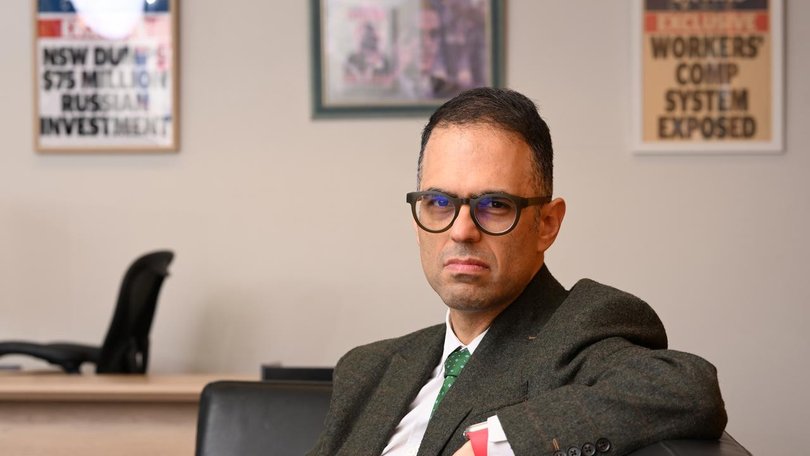NSW Treasurer Daniel Mookhey aware of inflation blare ahead of of budget delivery

The man who writes the cheques for Australia’s largest state budget can finally focus on the future.
Inflation was “blaring” in NSW Treasurer Daniel Mookhey’s ears when he was compiling his first two budgets after Labor returned to government in 2023 for the first time in 12 years.
“But the challenge in front of the state and the nation is making sure that we are growing our economy fast enough to support a rise in living standards,” he tells AAP as he prepares to hand down his third.
Sign up to The Nightly's newsletters.
Get the first look at the digital newspaper, curated daily stories and breaking headlines delivered to your inbox.
By continuing you agree to our Terms and Privacy Policy.Mr Mookhey says Tuesday’s state budget is about the future of the state’s essential services and economic growth.
“There’s a lot of opportunity and a lot of ambition in NSW and the changes we’re making are designed to hold on to what we love ... but also ensure that our kids and our grandkids have the same level of opportunity that we had,” he says.
While receding inflation and distance from the COVID-19 pandemic’s associated spending have allowed the treasurer to cast an eye to the future, issues from the past remain.
Framed in Mr Mookhey’s parliament office is a newspaper headline relating to the underpayments scandal in the state’s workers’ compensation scheme he played a role in exposing in opposition.
The page is yellowing with age as Mr Mookhey pushes to reform a scheme he is now in charge of, and which he argues is becoming unsustainable due to the rising cost and prevalence of psychological injuries.
“It’s been a hard case to argue,” he says.
“This system is failing everybody. It’s a system that is fundamentally broken.”
Changes are simmering on the back burner after a parliamentary inquiry prevented action before the budget.
Mr Mookhey hopes reform can create a “prevention culture” that limits psychological injuries from occurring.
Outside of the workplace, he has promised some reassurance to people dealing with mental health issues and their loved ones.
“They will see more investment in mental health resources in our health system and they will see more investment when it comes to our social interventions,” he says.
However, public psychiatrists at the pointy end of mental health crises should not expect the budget to deliver a pay rise at the level they have been calling for amid resignations in protest and arbitration in the state’s Industrial Relations Commission.
The federal distribution of GST to the states also continues to frustrate Mr Mookhey after dashing his hopes of a surplus in 2024.
NSW now receives its lowest share of GST since it was introduced - about 85 cents for every dollar raised.
“What frustrates me is not so much that we support the other states, it’s just the missed opportunities,” he says.
The distribution needs to change but the tax’s bigger proportional hit on the spending power of lower-income Australians means Mr Mookhey does not support raising the rate.
“We can do better,” he says.
“What we need to focus on is just making sure the system is simple, the distribution is fair, the distribution is predictable, but also the distribution is understandable.”
Another federal issue with implications for state budgets is the rise of the black market for illicit tobacco fuelled by rising excise on dinky-di durries.
The market shift is robbing the Commonwealth of expected revenue and creating criminal complications for states.
It has already led to increased funding for enforcement within the health budget, but Premier Chris Minns indicated earlier in June a decision would have to be made about the resources devoted to combating illicit tobacco sales.
While smoke clouds what the budget might do to address the issue, Mr Mookhey notes it is a source of public anxiety.
“It’s right and fair that we respond to community concerns about it ... we’re going to have to work through what is the right solution.”
The tax issues are part of what economic researchers at the e61 Institute call a “vertical fiscal imbalance” that characterises the nation.
“The states carry many of the spending responsibilities but lack equivalent revenue-raising capacity,” chief executive Michael Brennan says, warning state finances are drifting onto an unsustainable path.
But NSW will at least bank a cash surplus in Tuesday’s budget for the first time since 2021.
“Which means we’re no longer borrowing money to pay our day-to-day bills as a government,” Mr Mookhey says.
“That gives us a platform for further progress.”
Australian Public Policy Institute chief executive Libby Hackett expects the budget will be a step forward, building on previous years.
“This will be a structural reform budget: supporting better service delivery, infrastructure alignment and long-term productivity, even in a tight fiscal environment,” Professor Hackett tells AAP.
“Moreover, this budget presents a real opportunity to advance whole-of-government objectives in cross-cutting areas.”
Opposition Leader Mark Speakman sees it differently, warning the state is heading for “yet another low-vision, low-value, low-energy budget”.
“We have had not one visionary pre-budget announcement.”
